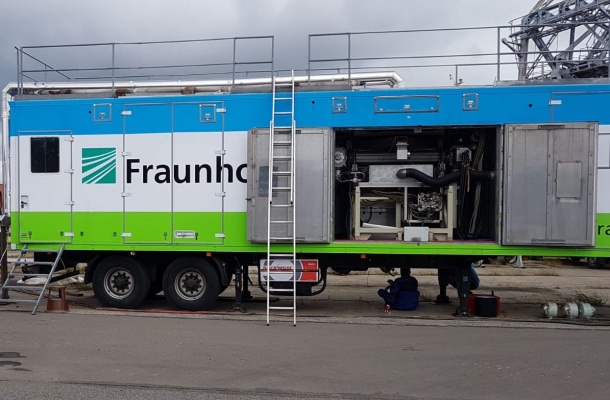
The mobile particle accelerator unit for ship exhaust gas treatment by Fraunhofer, 05.07.2019.
Photo: Riga Technical University
ARIES PoC stands for Proof of Concept under the «Accelerator Research and Innovation for European Science and Society» project
The proof to be made here is connected with the development of a hybrid electron accelerator system for the treatment of marine diesel exhaust gases.
The International Maritime Organization (IMO) has recently enforced stricter global regulations for emissions of sulphur oxides (SOx) from ships as from 1 January 2020, also known as IMO Global Sulphur Cap 2020. There is also a separate regulation for nitrogen oxides (NOx). The latest limits have been in force since 1 January 2016 for emission control areas (ECA) and will expand from 1 January 2021.
To solve this crucial environmental problem project consortium members altogether use an innovative particle accelerator technology for the ship engine exhaust gas treatment to meet the new environmental regulations.
Objectives:
The project is time- and resource-demanding. The consortium members have already patented some of the crucial design elements and technologies used in the proposed exhaust gas cleaning system, which is continuing its development.
Project data have been further analysed in the Master's thesis «Impact on the Maritime Industry from an Introduction of a Hybrid Exhaust Gas Cleaning Technology» developed by Aivis Abele student of Western Norway University of Applied Sciences.
Discussions about this idea started in 2017 with the project kick-off meeting in Warsaw at INCT in October 2018, which was followed by a number of technical, coordination and management meetings. An experiment was carried in June 2019 at Riga Shipyard on tug boat “ORKANS” to prove the concept in a real environment. The data was collected and has been analyzed to continue the development of this system and make it commercially available.
Participants:
There has also been valuable input from the advisors of the project:
H2020 programme: Integrating Activity
Implementation stage: finalizing
Execution of the project:
More information on the project
Total project expenses: 546 790 EUR
Project implementation period: October 2018- October 2020 (24 months)